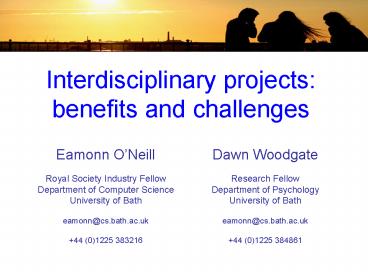Eamonn ONeill - PowerPoint PPT Presentation
1 / 12
Title:
Eamonn ONeill
Description:
The current generation of interconnected devices represents only the start of a ... Epidemiologists. Public interest groups ... inter alia. Who do we need... – PowerPoint PPT presentation
Number of Views:36
Avg rating:3.0/5.0
Title: Eamonn ONeill
1
Interdisciplinary projects benefits and
challenges
- Eamonn ONeill
- Royal Society Industry Fellow
- Department of Computer Science
- University of Bath
- eamonn_at_cs.bath.ac.uk
- 44 (0)1225 383216
Dawn Woodgate Research Fellow Department of
Psychology University of Bath eamonn_at_cs.bath.ac.u
k 44 (0)1225 384861
2
Some of our current collaborators
3
Why we need all these (different) people
- 1966 HP 2116A
- 2009 Nokia N97
4
The approaching ubiquity of computing
- Ubiquitous Computing Grand Challenge Manifesto
- Chalmers, Chalmers, Crowcroft, Kwiatkowska,
Milner, ONeill, Rodden, Sassone Sloman (2006) - www-dse.doc.ic.ac.uk/Projects/UbiNet/GC/manife
sto.html - The current generation of interconnected devices
represents only the start of a shift towards a
world of ubiquitous computing. ... We will
increasingly share the world we inhabit with a
massive set of embedded computational elements
capable of sensing our activities and responding
to them in a variety of ways. Ubiquitous
computing is a challenge that affects all of
computer science. It asks fundamental questions
about how we might reason about computer systems
and computability, how we might develop complex
ubiquitous systems, and how we might understand
the experience of environments that are supported
by ubiquitous computing - The challenge draws together researchers from
three perspectives engineering, user experience
and theoretical
5
Who do we need?
- Computer scientists
- Psychologists
- Sociologists
- Electronic engineers
- Mathematicians
- Architects/Urban planners
- Policy makers/Legislators
- Epidemiologists
- Public interest groups
- inter alia
6
Challenges to interdisciplinary research
- Shared language and understandings
- Shared aims and objectives
- Distribution and recognition of resources
- Attribution and authorship
- Need to avoid critical dependencies, especially
in high risk research
7
Managing WPs and dependencies
WP1 Space Syntax
WP2 Security, privacy trust
Knowledge of users, space technologies
WP5 Prototyping deployment
WP4 User engagement
WP3 Context aware service discovery
WP6 Project management
8
Additional challenges with industry
- Who are industry? - large corporations and SMEs
present different issues - Corporate aims frequently change
- Different academic vs industry rhythms
- Staff are frequently restructured
- Commercial confidentiality
- Intellectual Property
9
Ethics
- Different disciplines have different histories
and approaches with respect to issues such as
research ethics - Need to develop shared approaches to the ethical
implications of research - Also ability to adapt these on the fly issues
are not necessarily obvious at the outset
10
(No Transcript)
11
Nature of interdisciplinary research
- Academic disciplines are a social construct.
Discuss - At the same time, the disciplinary tradition has
profoundly influenced how people are taught, how
research is conceived and structured and, more
fundamentally, even how we think about science - There is now a growing realization that there are
some issues that one discipline (or group of
disciplines) cannot adequately address on their
own
12
Thank you
- eamonn_at_cs.bath.ac.uk
- cssdw_at_bath.ac.uk
- http//www.cs.bath.ac.uk/pervasive































